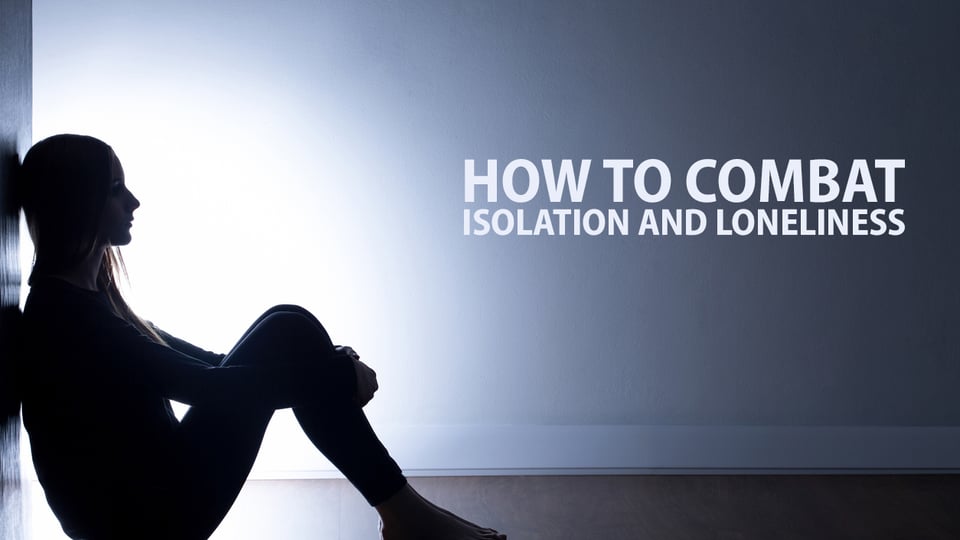How to Combat Isolation and Loneliness
What should you do when you feel separated and distant from others? Can emotional or physical isolation be overcome? How can we manage loneliness?

It took about 20 months to hit me.
Everyone has his or her own story about March 2020. In brief, as a health-care provider, not much changed for me immediately. I continued treating patients. Around me, friends and family shared stories about isolation, separation and discontentment.
I felt that to some extent, but my experience in the early days of the pandemic was mostly related to the way that sickness upended my patients’ lives. For me, it wasn’t so different from the years before COVID-19. But it took a bit more effort to empathize with all the challenges people were facing due to the pandemic and its effects on daily life.
Most days when work finished, I just wanted to be alone. I didn’t want to see people, ask about their day, or give more of myself to them.
Or so I thought.
A personal realization
I am an introvert. That is, my energy, my recharging, comes from limiting contact with other people. With being alone. Solitude.
So, when I say that it took 20 months to hit me, it took that long for me to recognize I was struggling with loneliness.
Loneliness is the emptiness that comes from feeling apart and isolated. And, wow, did it hit me over the head when I realized it. How could someone who feels refreshed by quiet and distance feel lonely? Yet it happened. Without realizing it, I suddenly longed for company and connection.
God did not call us to live in total isolation. He doesn’t want us to prove how strong and capable we are by isolating ourselves.
There’s a significant chance that you’ve experienced loneliness at some point in your life. These past few years have been extremely challenging for some of my extroverted friends. However, most people—introverts as well as extroverts—have at some point in their lives experienced loneliness.
Maybe it was the result of a move that separated you from your friends and family. Maybe it was from being in a situation where you had few people you could relate to. Maybe you’ve aged to the point where most of your friends have died.
Loneliness can be brought on by a variety of external factors in life. Whatever the cause, loneliness is something that affects everyone at times.
Has loneliness been hiding behind fatigue, frustration or even anger? Western culture often praises independence and self-sufficiency. But God did not call us to live in total isolation. He doesn’t want us to prove how strong and capable we are by isolating ourselves. In John 15 Christ spoke at length about our need to abide in Him as the true vine—to be together, not separate.
So, how should we handle it? What then should we do about it? What can we do if we feel alone, either physically or emotionally?
Ideas for managing loneliness
1. Acknowledge your loneliness.
“I’m lonely.”
Once you’ve acknowledged your loneliness, pray to God about it. Don’t wait. He’s our Father. He cares about our daily needs (1 Peter 5:7), including our need for connections. He created us to be part of a family—both on the human and spiritual level. He created us to be social beings. Relationships are so important to Him that the second great commandment is about loving others as ourselves (Matthew 22:39).
2. Make a concentrated effort to reach out to others.
And be willing to let others reach out to you.
Ecclesiastes 4:9-11 discusses two people who labor and support each other. There is an implication of trust, which does not grow overnight. In our world, we have many methods to reach out to others—the Internet, a phone, pen and paper, and travel. There are probably people in your congregation, your neighborhood and your community who are feeling lonely too. Some of them are waiting for a connection. Some of them may have already tried to connect with you.
Video chat technology allows us to communicate with friends who live far away.
But I don’t recommend trying to create deep connections with every single person in your social circle. Just as severe independence is not sustainable, neither is pouring your whole self into every person you meet.
3. Be willing to be vulnerable.
Going beyond mundane conversations can leave us open to criticism, offense and—dare I say it—hurt. Use your best judgment as to whom and about what you open yourself, but beware of closing yourself off from others in a vain attempt to never be hurt.
Although there is always a possibility of being offended or hurt, there is an even lovelier opportunity for genuine and long-lasting relationships. When we open ourselves to others, we learn to better love one another and grow in God’s character (1 John 4:20).
4. Limit your time on social media.
When we open ourselves to others, we learn to better love one another and grow in God’s character.
Reliable research has demonstrated that using social media excessively can increase negativity and hurt our mental health. Social media algorithms are designed to divert our attention. How can you build relationships and pursue good and noble pursuits (Philippians 4:8) when you’re constantly looking at a screen?
There is nothing wrong with using social media to stay in touch with people who are far away, but spending hours on it or letting it affect your attitude is counterproductive to the struggle against loneliness.
For more insight on this topic, read “Does Social Media Connect or Disconnect Us?”
Long-term solutions for loneliness
Naturally, short-term fixes are temporary. To manage loneliness in the long term requires building your life in a way that makes you open to opportunities for greater connection. But it takes effort.
Continue doing what you can to fight loneliness. Accept that dinner invitation. Give some of your Sunday to writing that letter. Invite the right people into your life.
Actively participating in regular church services and building strong relationships with people of like mind are keys to overcoming loneliness.
To learn more about the importance of attending church services, read about “Christian Fellowship.”
Date Posted: July 8, 2022

